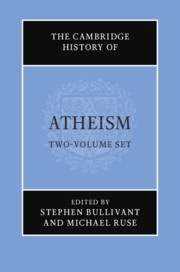Book contents
- The Cambridge History of Atheism
- The Cambridge History of Atheism
- Copyright page
- Dedication
- Contents
- Acknowledgments
- Contributors
- Introduction
- Part I Preliminaries
- Part II Atheisms in History
- Part III Reformation, Renaissance, Enlightenment
- 10 Reformation
- 11 Early Modern England
- 12 Spinoza and the Low Countries
- 13 Seventeenth- and Eighteenth-Century France
- 14 The Scientific Revolution
- 15 The Scottish Enlightenment
- 16 Al-Ghazālī
- 17 Lives of Jesus and Historico-critical Skepticism
- Part IV Classical Modernity: Philosophical and Scientific Currents
- Part V Classical Modernity: Social and Political Currents
- Part VI Twentieth and Twenty-First Centuries: Intellectual and Artistic Currents
- Part VII Lived Atheism in the Twentieth- and Twenty-First Centuries: Case-Studies
- Part VIII Emerging Atheisms in the Twenty-First Century
- Part IX Conclusion
- Index
- References
11 - Early Modern England
from Part III - Reformation, Renaissance, Enlightenment
Published online by Cambridge University Press: 25 September 2021
- The Cambridge History of Atheism
- The Cambridge History of Atheism
- Copyright page
- Dedication
- Contents
- Acknowledgments
- Contributors
- Introduction
- Part I Preliminaries
- Part II Atheisms in History
- Part III Reformation, Renaissance, Enlightenment
- 10 Reformation
- 11 Early Modern England
- 12 Spinoza and the Low Countries
- 13 Seventeenth- and Eighteenth-Century France
- 14 The Scientific Revolution
- 15 The Scottish Enlightenment
- 16 Al-Ghazālī
- 17 Lives of Jesus and Historico-critical Skepticism
- Part IV Classical Modernity: Philosophical and Scientific Currents
- Part V Classical Modernity: Social and Political Currents
- Part VI Twentieth and Twenty-First Centuries: Intellectual and Artistic Currents
- Part VII Lived Atheism in the Twentieth- and Twenty-First Centuries: Case-Studies
- Part VIII Emerging Atheisms in the Twenty-First Century
- Part IX Conclusion
- Index
- References
Summary
The history of atheism is usually narrated around a watershed separating a modern “speculative” atheism defined with scientific precision from older traditions in which atheism functioned as a pejorative denoting not just godlessness but various forms of heresy and libertinism. According to such accounts, a diffuse tradition of polemical abuse was gradually refined into the defined dogmatism of modern philosophical atheism. Alan Charles Kors influentially argued that medieval and early modern atheism was largely a boogeyman projected by orthodox writers interesting in honing their own apologetical skills. The Cartesian revolution disrupted these orthodox efforts, without adequately replacing their arguments for theism (Kors 1990). A similar timeline is proposed in Michael Buckley’s At the Origins of Modern Atheism, in which he attributes modern atheism to ill-fated Christian apologists attempting to use the new science to prove, rather than deny, God (Buckley 1990).
- Type
- Chapter
- Information
- The Cambridge History of Atheism , pp. 202 - 222Publisher: Cambridge University PressPrint publication year: 2021

